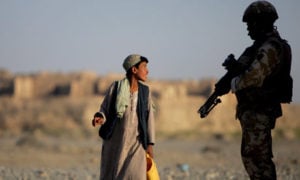
The international community has been involved in Afghanistan since 2001 as a consequence of the 9/11 attacks on U.S. soil. By 2003, NATO took control of the ISAF and expanded its operations across all Afghanistan. Likewise, the Europeans have been involved in Afghanistan through several types of missions. On one side, Europeans have contributed to ISAF efforts by sending troops under the NATO umbrella as part of the counter-insurgency effort. On the other side of this military contribution, Europeans have sent policemen as part of the EUPOL Afghanistan mission launched in 2007, in addition to the European Gendarmerie Force also deployed in 2007. The European police mission is a continuity of the German police-training mission launched in 2002. Thus, the EUPOL-A was dispatched as an answer to U.S. pressure for increased EU contribution on the Afghan stage. Under U.S. pressure, the EU had two options: to be marginalized for inaction or to join the U.S. by deploying an EU mission.
Since the beginning, the EUPOL-A has been plagued by lack of leadership, limited financial and material supports, and personnel shortage. Furthermore, because of its civilian mandate, the EUPOL-A does not qualify for NATO protection, limiting EUPOL personnel interventions on the ground. Last but not least, it is the first CSDP mission launched during war, making it the most perilous of all.
The intervention of Europeans in Afghanistan underlines the schizophrenic nature of Europe. On one side, EU Member States are involved in combat operations as contributors to NATO forces. On the other side, EU Member States are contributing to a civilian mission under the EUPOL umbrella. These political choices made by European capitals are sending mixed signals concerning the nature of the EU as a global actor.
The counter-insurgency strategy developed by the Americans during the second war in Iraq and then applied in Afghanistan has had limited success for one obvious reason: while NATO forces continue to kill civilians, the results will be limited. With a total takeover by the military in Afghanistan, the priority of the military must be the protection of civilians. Because this has not been the case, the leadership should shift from a military to a civilian one as argued by Luis Peral.
The latest numbers of civilian casualties are a clear proof of such an argument. According to Liberation, a leading French newspaper, in 2011 more than 1.400 civilians have been killed, which represent a 15% increase compared to the same semester last year. The UNAMA report published on June 19, 2011 contributes to this empirical literature on the question of civilian casualties. The first 6 months of 2011 saw an increase of death of civilians by airstrikes, which is at 79 as opposed to 69 in 2010. However, this represents only 5% of the total casualties for 2011. The majority of civilian casualties come from IEDs (30%), ground combats (21%) and suicide attacks (19%). The increase of civilian casualties often leads to an increase in recruiting by the Taliban.
On the other hand, the coalition fatalities have been at 2,588 since 2001. This number underscores the trend of causalities in modern warfare, where civilians increasingly suffer more than soldiers. Interestingly enough, European media tends to emphasize the death of one or two soldiers rather than civilians. The war in Afghanistan has been questioned because of the death of five French soldiers these last couple days. However, the war has not been questioned for its gap between counter-insurgency theory and failure to apply it on the ground by protecting civilians. Civilian casualties, from a military standpoint, fall under the category of collateral damage. It is becoming quite surprising to see a surge of criticism in Europe after the death of one soldier, and faint reaction after the deaths of dozens of civilians. One thing is certain; there is an illusion counter-insurgency can be done without casualties. The narratives have changed from regime change to counter-insurgency, and we are simply paying the cost of the continuation of the policies of the Bush era. Once the West – the coalition of the willing – was trying to design new regimes in Iraq and Afghanistan. Today, the global West is not trying to change the regimes but instead training local security forces in order to let them assume the overall security realm of their countries.
As argued by Luis Peral of the EU-ISS, a transfer of power needs to be effectuated from military leadership to a civilian one. He argues that a transfer of leadership to the UN is the appropriate solution. He claimed that, “It is also time to re-engage in effective multilateralism beyond empty commitments, and it is only the UN that has accumulated relevant expertise—from prior operations elsewhere to experience on the ground in Afghanistan—to take the initial lead in the more crucial aspects of international operations, including anti-corruption efforts, improved local governance, and security sector reform.” Others such as Seth Jones of the RAND Corporation argue that counter-insurgency in Afghanistan should remain a military project. He focuses on two aspects: “assist Afghan national and local forces [to] degrade the insurgency, and target terrorist leaders.” NATO and the U.S. understand the importance of counter-insurgency and civilian approach to security. However, one can doubt the success of a civilian strategy implemented by a military leadership. The EU, through its EUPOL-A, has tried to lead in these sectors, but was unable to do so due to limited commitments from its member states and lack of leadership in Brussels, in the capitals, and in Afghanistan. The EU had its chances to lead the civilian approach to security, but because of its growing schizophrenic nature, it has fallen behind once more.